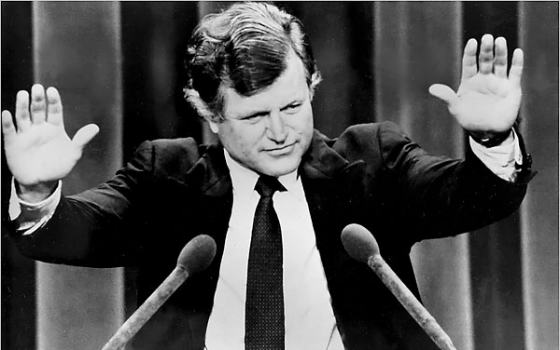As all major news organizations are reporting, Massachusetts Senator Edward Kennedy passed away last night at the age of 77. Other news sites and blogs will offer a comprehensive review and description of his personal and professional life, so I would just like to share my own thoughts on his legacy as it relates to racial/ethnic relations and civil rights, but also what it means to be a “liberal.”
Even though he grew up in wealth and privilege, he always stood up for the less privileged and powerful among us. Among his many causes while in Congress were his championing of the Patients’ Bill of Rights and perhaps most famously, his tireless efforts toward passing universal healthcare coverage. Indeed, in his four-plus decades of service in the Senate, he amassed quite an impressive record of legislation and public service.
I will also remember his work on behalf of racial equality and justice. He was an early, consistent, and strong advocate for civil rights, exemplified by his record on supporting and sponsoring legislation on voting rights, education, labor rights, and poverty that helped all Americans but disproportionately benefited people of color and the poor the most. As the New York Times notes:
He led the Congressional effort to impose sanctions on South Africa over apartheid . . . . His most notable focus was civil rights, “still the unfinished business of America,” he often said. In 1982, he led a successful fight to defeat the Reagan administration’s effort to weaken the Voting Rights Act. In one of those bipartisan alliances that were hallmarks of his legislative successes, Mr. Kennedy worked with Senator Bob Dole, Republican of Kansas, to secure passage of the voting rights measure, and Mr. Dole got most of the credit. . . .
At a pivotal moment in the 2008 Democratic presidential primaries, Mr. Kennedy endorsed Senator Obama for president, saying Mr. Obama offered America a chance for racial reconciliation and an opportunity to turn the page on the polarizing politics of the past several decades.
“He will be a president who refuses to be trapped in the patterns of the past,” Mr. Kennedy told an Obama rally in Washington on Jan. 28, 2008. “He is a leader who sees the world clearly, without being cynical. He is a fighter who cares passionately about the causes he believes in without demonizing those who hold a different view.”
But ultimately, I will remember Senator Kennedy for his uncanny and natural ability to balance two seemingly contradictory identities — on the one hand, being a true liberal Democrat and on the other hand, being able to cross ideological boundaries and to genuinely collaborate with Republicans on bipartisan causes.
Until recently and especially during the presidencies of Reagan, Bush I, and Bush II, due to the ideological clashes and culture wars within American society, it was a derogatory term to be called a “liberal.” Nonetheless, there are many of us, including me, who are proud to be liberal and I saw Senator Kennedy as a model for being a true liberal. As I mentioned, his congressional and public service record on behalf of traditionally “liberal” causes is unquestioned. Even when it was considered an insult to be called a liberal, Senator Kennedy never backed down from his beliefs and passion to achieve meaningful equality and justice for all Americans.
But in order to get things done and achieve results, the practical reality is that it requires collaboration. Understanding that, Senator Kennedy was extremely skilled at working with fellow Republicans and reaching compromises that still retained his core ideals. The New York Times again summarizes:
Although he was a leading spokesman for liberal issues and a favorite target of conservative fund-raising appeals, the hallmark of his legislative success was his ability to find Republican allies to get bills passed. Perhaps the last notable example was his work with President George W. Bush to pass No Child Left Behind, the education law pushed by Mr. Bush in 2001. He also co-sponsored immigration legislation with Senator John McCain, the 2008 Republican presidential nominee. One of his greatest friends and collaborators in the Senate was Orrin Hatch, the Utah Republican.

In the end and for me personally, Senator Kennedy will always embody the Buddhist-like, yin-and-yang ideal of achieving balance in how we conduct our lives. He came from wealth and privilege but he never wavered in standing up for the downtrodden and underprivileged. His personal life was not without controversy but he worked tirelessly in excelling in his professional life. And he always stood proud and true to his liberal convictions but also knew when and how to collaborate with others to get results and move forward as a nation.
Senator Edward Kennedy’s legacy is one that we can all learn from as Americans, today and always. In his own famous words from the 1980 Democratic convention,
The work goes on, the cause endures, the hope still lives, and the dream shall never die.
